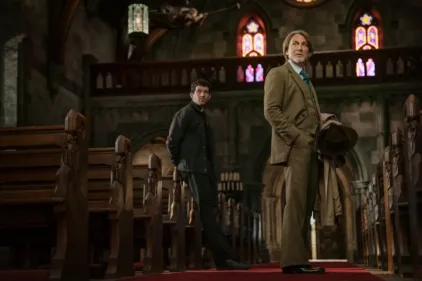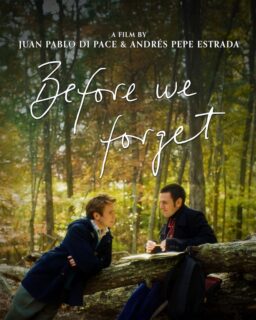LOS ANGELES Kurt Russell says that Mel Gibson has a sort of Gary Cooperish quality, a kind of inbred honesty that comes across no matter what kind of role he’s in. That quality is so strong that it even causes some confusion in “Tequila Sunrise,” the new thriller now at Chicago area theaters in which Gibson plays a retired drug dealer, and Russell plays the narc who was his boyhood friend.
The question becomes, has Gibson really gone straight? Or does he just want you to think he has? The movie wants to keep you in doubt, but Gibson himself seems so trustworthy, his face so open and honest, that it’s hard to doubt him when he says he’s retired from the narcotics business.
“There’s not much, really, to tell you whether the guy’s dealing or not,” Gibson was saying recently after seeing the movie all the way through for the first time. “He tells you he’s not. And you don’t actually see him doing anything too dastardly. I think it was constructed that way, to leave an ambiguity about his intentions.”
That ambiguity is at the heart of the movie, as Russell learns that a big drug shipment is coming in from Mexico, and the wholesaler is one of Gibson’s best friends. Is Gibson coming out of retirement, or not?
The movie was written and directed by Robert Towne, who is known for his labyrinthine plots in screenplays such as “Chinatown.” Towne has surpassed himself this time with a movie in which everybody’s motives are suspect. Feeling a certain confusion myself after seeing the film, I asked both actors how they’d felt when they read the screenplay. Did they have discussions with Towne about the complexities of the plot?
“A lot of them,” Russell said, laughing. “Like, what does this mean? Or, even more intriguing to me, what does this line mean? Or what doesn’t it mean? The plot gets pretty twisty, and pretty turny. It’s a tough movie to go get popcorn in.”
Gibson said he felt sort of the same way. “The first time I read the screenplay,” he said, “I didn’t get it. So I read it again, and it became a little clearer. You can’t find out about your character by reading your own scenes in this movie. Most of the discoveries about each character are made while he’s offscreen.”
For Gibson, the role represents a change in direction. In a movie where one guy is the cop and the other is the drug dealer who may or may not have reformed, you’d expect Gibson to play the cop and Kurt Russell to play the shadier character. But by reversing the casting, Towne has set up an interesting tension in the movie – especially when both men fall in love with Michelle Pfeiffer, who plays a restaurant owner.
Russell comes on strong, and Pfeiffer likes him. Gibson is shy and backward, eating in the same restaurant night after night because he admires the woman from afar. But eventually Gibson wins (and deserves) Pfeiffer’s love, and maybe that’s why he was well-cast. There is a quality in his screen presence of earnestness, of trustworthiness, and yet he never seems to take himself too seriously.
“Bob described the movie to me as being like a horse race,” Gibson said. “He told me to imagine Clark Gable and Gary Cooper in a horse race, and the firing gun goes off, and Clark Gable’s out in front all the way around, and Gary Cooper’s trying to catch him, and he catches him and passes him at the wire. That’s what we’re doing here.”
Acting itself is something that doesn’t always seem in the front of Mel Gibson’s mind. He lives with his wife and five children on a ranch in the Australian Outback, and recently took off from acting for two years just to spend time with them. Although he has raised some hell in the past with episodes including a drunk-driving charge in Toronto, there has never been any question about his devotion to his family, and he says he has settled down, now, in his early 30s, to a quieter lifestyle.
“I don’t have to be working every moment,” he told me. “Why turn something good into a hard job? It’s more special when it’s not a daily occurrence. It doesn’t cheapen it so much.”
And when you’re not acting, you’re at home in Australia?
“Yeah, it suits me. I like it.”
What’s it like on your ranch?
“It’s pretty private because it’s a parcel of land that’s yours. You feel secure in the fact that it’s your domain, you can do with it what you like. You’re the boss, the king of the domain.”
It’s a working farm?
“Yeah, and that’s important. It has to work, or at least pay itself back.”
And the farm is the reality for your family, not the Hollywood scene.
“Yeah. We’re raising them as country kids.”
Do they watch your movies?
“Not all of them, but some of them. I’ve never let them watch `Lethal Weapon,’ for instance. We give them a lot of Disney and that sort of thing. Old Hitchcock movies like `North by Northwest.’ And all those old black and whites like `Oliver Twist’ and `David Copperfield.’ Shirley Temple. They really get into those.”
Although Gibson is often thought of as an Australian, he’s actually more of an Australian-American. He was born in Upstate New York, and moved with his family to Australia when he was 11. Although his natural speaking voice has an edge of the Australian accent, he shifts effortlessly into American for “Tequila Sunrise.”
Gibson worked in Australian films for three years before becoming an international star almost overnight with two enormous back-to-back hits. In “The Road Warrior” (1981), he repeated the role of a futuristic nomad that he’d first played in the little-seen “Mad Max” two years earlier. And in “The Year of Living Dangerously” (1983), he showed he was as effective in a serious drama as in an action picture. Ever since, he’s alternated between the two kinds of roles, playing an action hero on “Mad Max Beyond Thunderdome” (1985) and “Lethal Weapon” (1987) and more three-dimensional characters in “The Bounty,” “The River” and “Mrs. Soffel,” all in 1984. For better or worse, the action pictures were enormous box-office hits, and the more serious films were financial disappointments.
My own notion is that the action pictures worked not because of the violence and special effects, but because they gave a freer rein to Gibson’s gift for humor. That was especially true in “Lethal Weapon,” where Gibson was a suicidal cop whose life was chaos, and Danny Glover was his partner, a laid-back family man.
I asked Gibson how he felt about the fact that the Max Mad character has taken on a life of his own, becoming the same kind of movie icon as James Bond, or Tarzan.
“The problem is to find a way to play a character like that without getting taken over by him,” Gibson said. “Sean Connery was so identified with Bond that it took him awhile to get over it, but he finally beat it. I think his mistake was to do Bond pictures one after another. I’ve tried to throw other things in the middle, a space it out a bit. I think what also helps is to drop back for a little while, disappear, so you’re not overexposed.”
Would you do another Mad Max picture?
“Never.”
Never of any sort?
“Well,” he sighed, “there could be, maybe someday, a kind of Max story that I would want to do. But it certainly isn’t being planned, and if it were, I wouldn’t want to be a part of it at this point. Maybe in 10 years.”
Mad Max in his 40s?
“You see what I mean.”
What are you going to do next?
“‘Lethal Weapon 2.’ ”
Same two guys?
“Yeah. It’s going to be interesting to see where it takes us, because you can’t do the same kind of thing we did before. I hope we can pull it off. It’s very difficult the second time around.”
Do you have any sort of master plan for your career?
“Yeah, but it doesn’t seem to stretch very far out in front of me. I don’t do it 10 years down the track. I just do it maybe three months in advance. I like to leave my options open.”
Talking with Gibson, I was remembering the first time I’d met him, down in Kingsport, Tenn., on the location of “The River.” I’d been told then that he was a difficult interview – shy, nervous, elusive, all of those things – but I found him low-key and disarmingly honest. I guessed that maybe his reputation for difficulty was just an innate reluctance to discuss his life in an interview.
This time, he seemed much more at home talking about himself, and he seemed more confortable with the fact that Mel Gibson was a movie star that people were curious about. At the end of the interview, I asked him about that, about the fact that he seemed relaxed and low-key even during a visit to the States to do almost nothing but publicity.
“Maybe that’s just my growing up,” he said. “I’m not a wise old guy yet, but thank Jesus I’m not in my 20s anymore. Ya know, it’s good to be on this side of the third decade. I’m enjoying it a bit more.”
You raised more hell in your 20s?
“Everybody does.”
You drank more?
“Oh, yeah, you do things more impulsively. You’re hotheaded, and you do stupid things, you get into messes you can’t get yourself out of, and you say stupid things. You have no idea what you’re talking about. It’s a little embarrassing to look back on those years.”
But do you ever miss the energy of all that craziness?
He laughed. “Yeah, I do. Especially when my back starts to flare up and I begin to feel like I ought to slow down a little. That’s something that never occurs to you in your 20s.”











